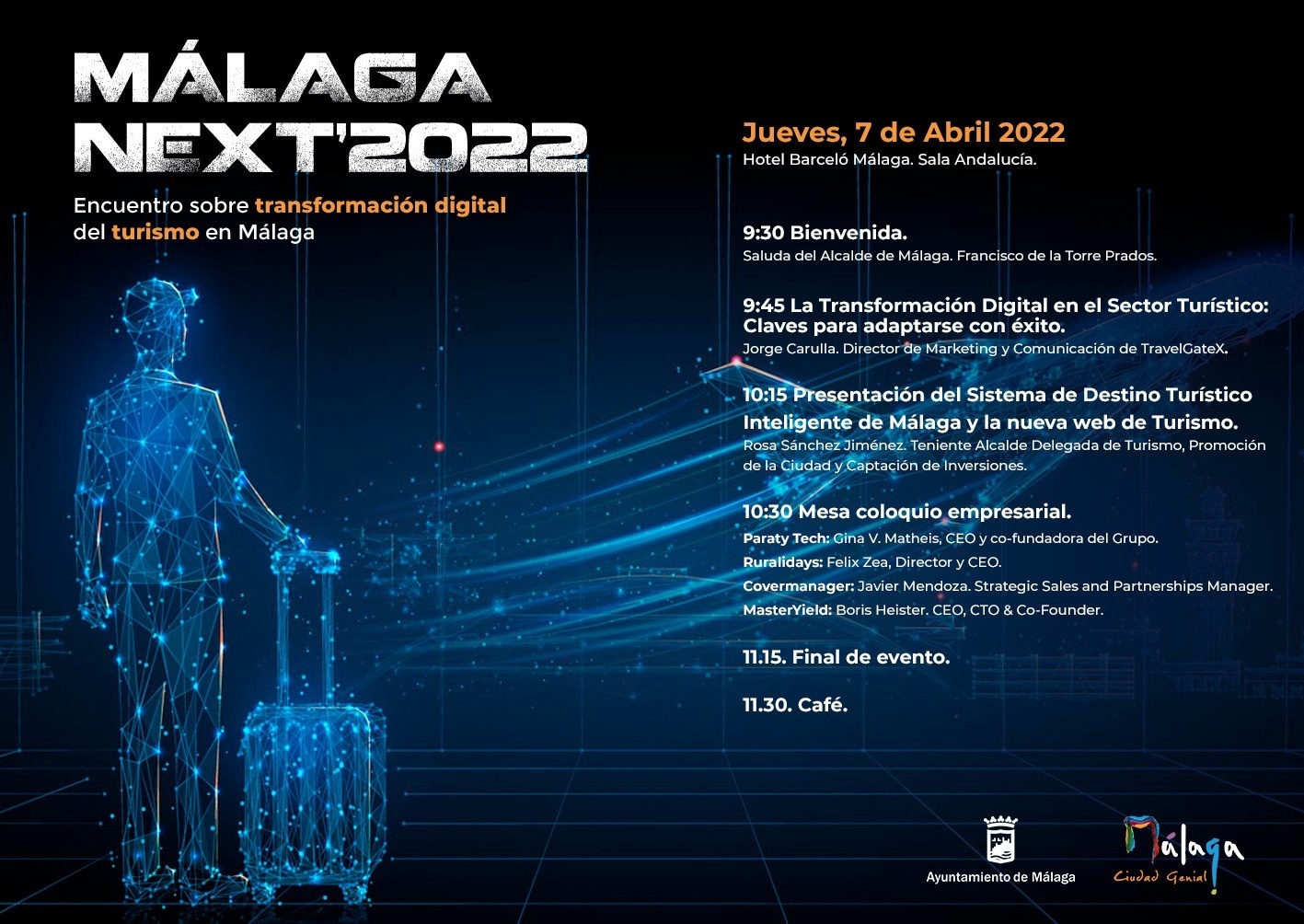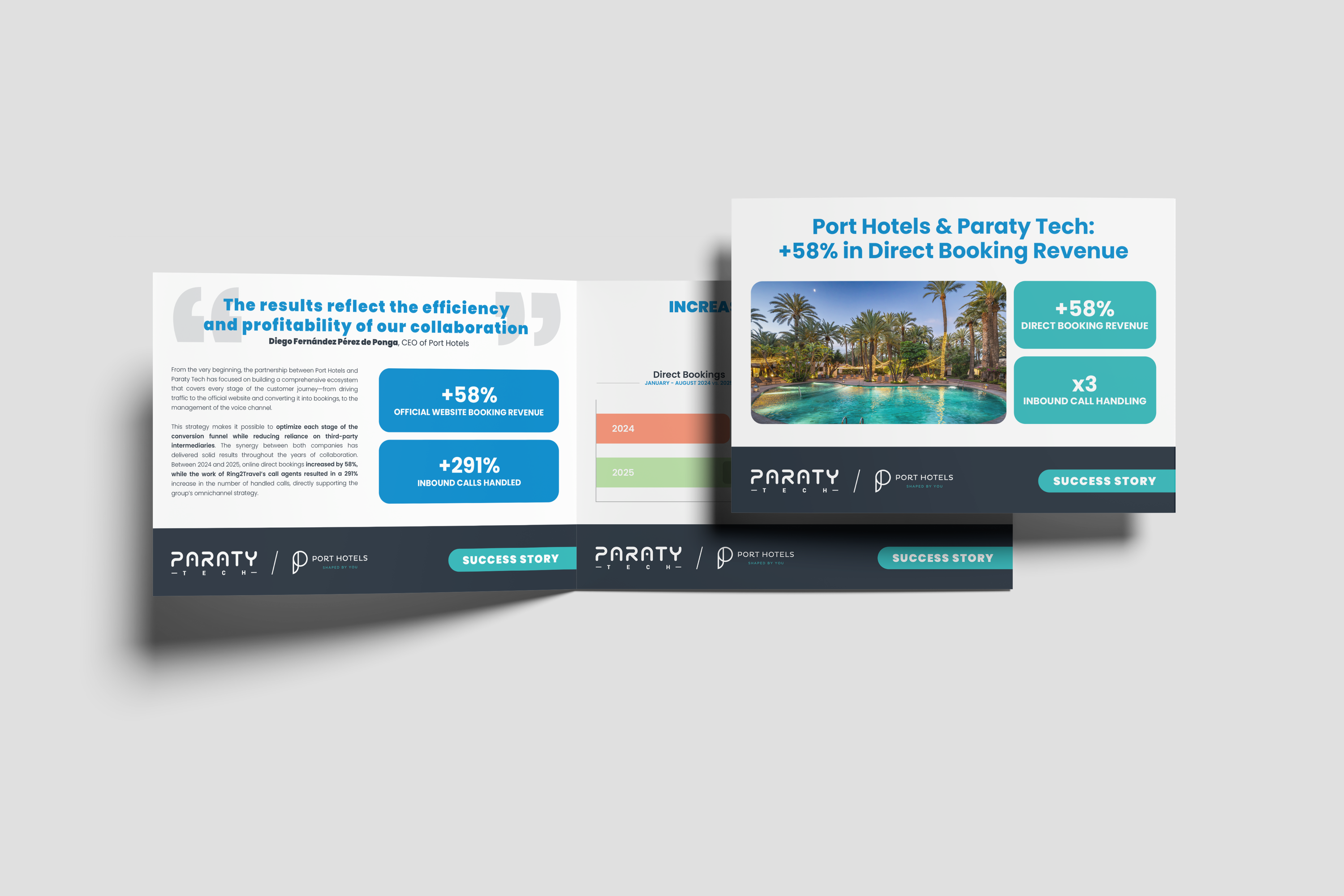Málaga Next ‘2022: Meeting on digital transformation of tourism in Málaga
Events 07/04/2022
Gina Matheis , CEO of Paraty Tech , participated today, Thursday, April 7, in the Business Colloquium Table of "Málaga Next '2022: Meeting on digital transformation of tourism in Málaga" organized by the Málaga City Council. Joining her were Felix Zea , director and CEO of Ruralidays , Javier Mendoza , Strategic Sales & Partnerships Manager of CoverManager , and Boris Heister , CEO, CTO & Co-founder of Masteryield .
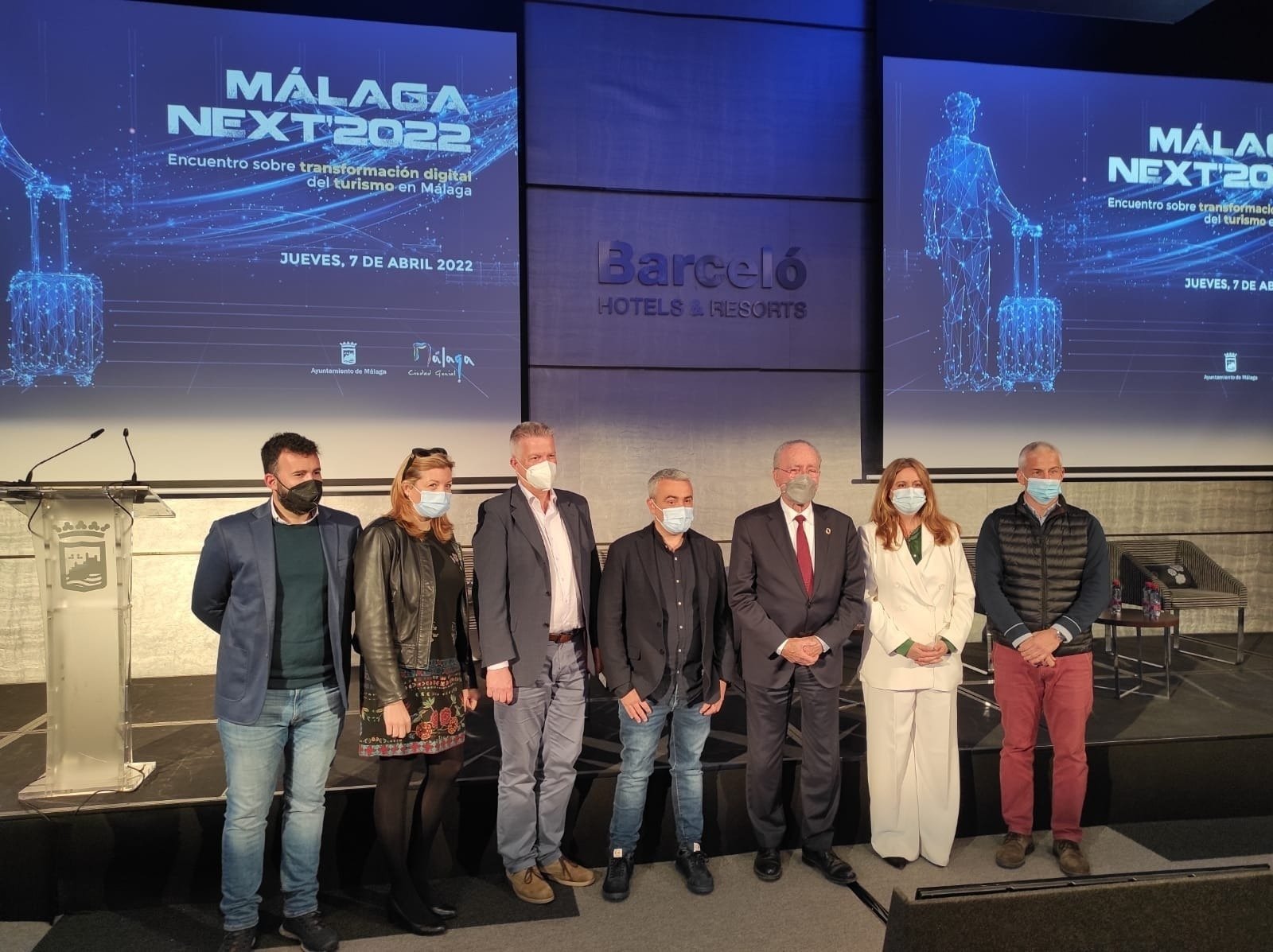
The table was preceded by speeches by the Mayor of Malaga, Francisco de la Torre Prados , and Rosa Sánchez Jiménez , Deputy Mayor Delegate of Tourism, Promotion of the City and Attraction of Investments, in charge of presenting the new tourism website of the province and the new Malaga Smart Tourist Destination System, designed by and for the professional tourism sector, which will provide tourism indicators and analysis with the aim of facilitating decision making (it should be noted that Turobserver, a company of the Paraty World group , partially nourishes this platform by providing data, together with other entities).
For his part, Jorge Carulla , director of marketing and communication at TravelgateX , gave an interesting presentation on Digital Transformation .
These are the words of Don Francisco de la Torre, Mayor of Málaga, who stated during his speech that "talking about digital transformation seems very appropriate" at this time, when Málaga is above the Spanish average in terms of digitalization in all sectors, not just tourism. However, he also stressed the importance of "knowing how to handle data and ensuring that companies are prepared to know how to interpret it and take advantage of it", in addition to ensuring that the data we have is really all that we need or that others are needed. He also referred to the reputation of the destination almost as an obsession with "knowing what those who visit us think and continuing to strive to be the best, the first." Not in vain, Malaga is the Spanish city with the highest number of tourist quality certificates for the destination, a condition that it valued very positively, although it clarified that "in the end, what matters to the client is having all the information to be able to plan properly." your visit". Finally, he said goodbye, hoping that the attendees "leave the event with renewed spirits to move forward in this direction, since it is the tourism sector that, to a greater extent, is lending its support to the economic and business reactivation of the city of Malaga."
Jorge Carulla, director of marketing and communication at TravelgateX, began his presentation “Digital transformation from a human approach. Leadership and business culture as keys to success" providing very revealing data:
Darwin said that it is not the strongest that survive, but those that adapt best. With this quote he was referring to the importance of generating value, of helping the client, whose needs we sometimes forget, when in reality we should ask ourselves questions like "what am I going to solve for them, what headaches am I going to save them, what benefit?" "I'm going to contribute." He then listed precipitating factors for digital transformation, such as "customers, the economy, technology, competition, etc."
The correct execution of a digital transformation process "improves efficiency, productivity, management, resilience, decision making, agility, commitment, etc." But it also entails possible "side effects, which always happen... in the end it is about the positive being above the negative", something in which the responsibility of companies and the people who make them up has a lot of weight:
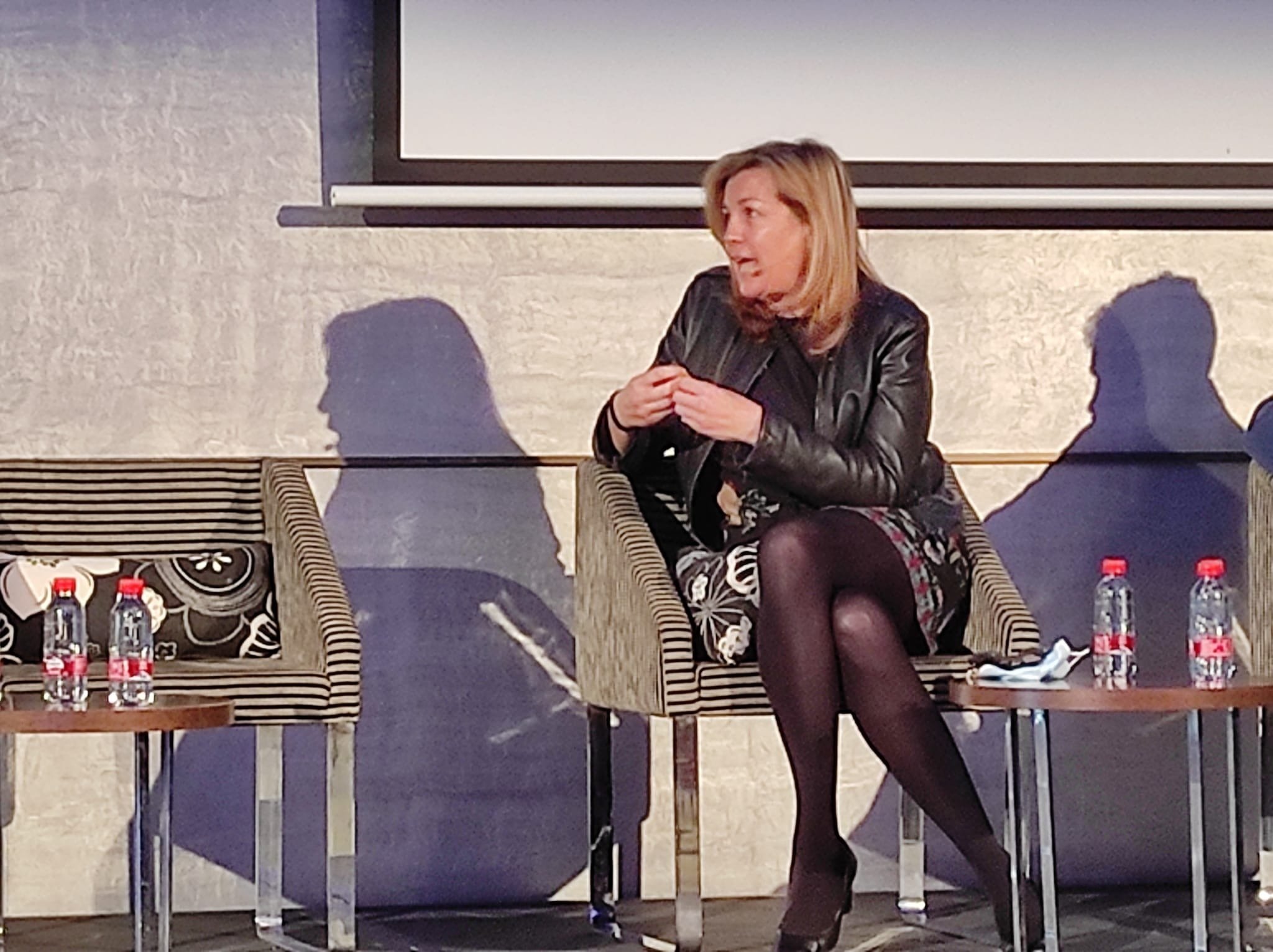
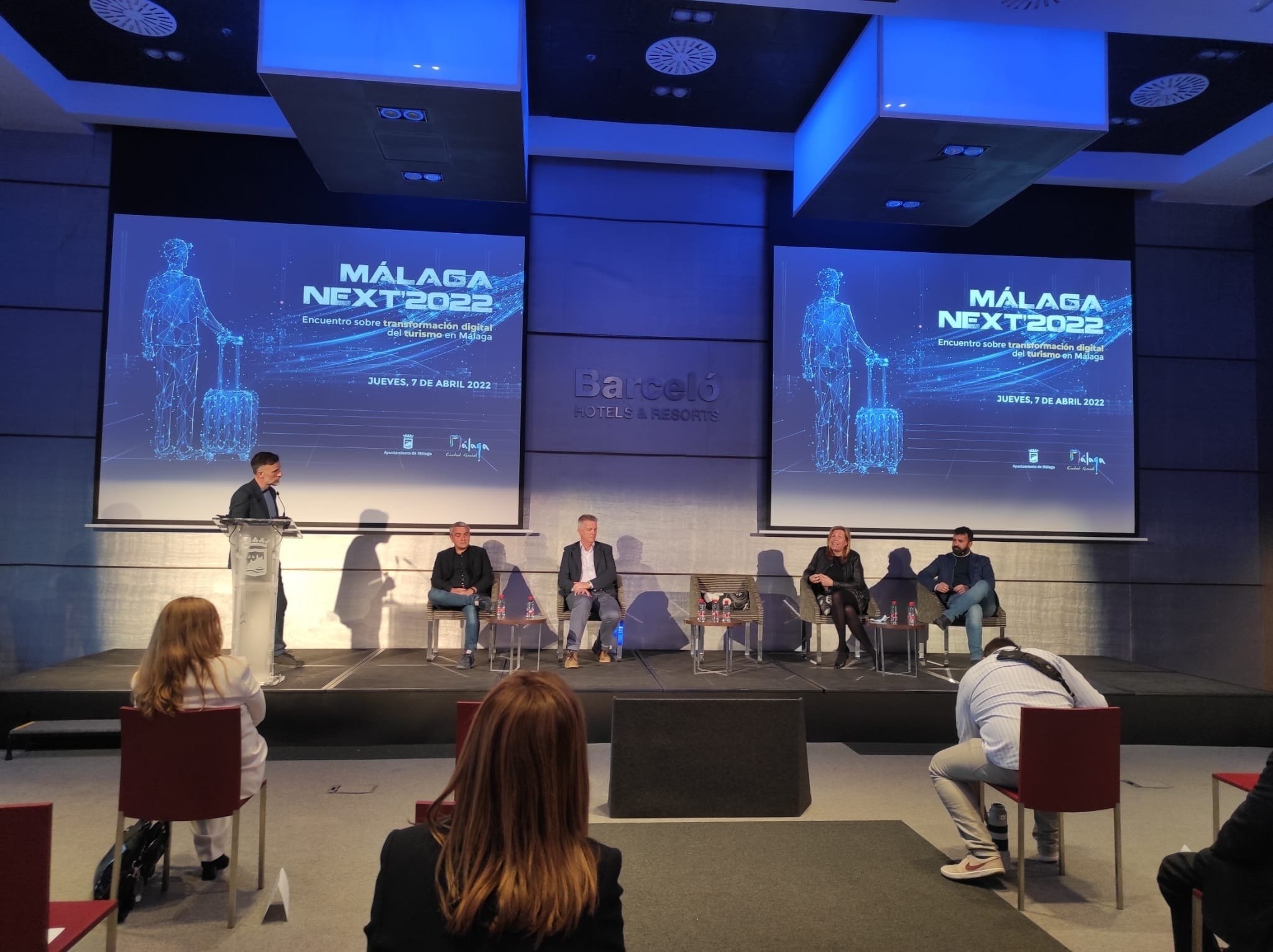
Gina Matheis opened the Business Discussion Table with this phrase from Henry Ford, thus answering the first question, related to the importance of information analysis. Once again, people and strategy came to the fore. Gina revealed that the first thing she asks her clients is "what their strategic plan is and if they have the time, money, training and people (most importantly) to execute it." Listen, in short. Because the reality, he added, is that we live in a "globalized world, in which not all information is useful for everyone and excess data is not good."
His fellow members expressed themselves along these same lines: While Boris Heister said that "it is useless to have too much data, nor to have people who do not know how to apply it, from the highest to the lowest of the business scheme", Felix Zea highlighted that "data is everything, but you have to know how to distinguish the important ones, what is happening now, but also see the evolution, because the needs have changed a lot," and Javier Mendoza concluded by emphasizing the importance of "its vocation for service original is not lost, it must be sent to all new additions, to differentiate useful data from that which is not.
But digital transformation processes are, without a doubt, a great challenge, and companies encounter barriers. One of them has to do, precisely, with the difficulty of business DNA remaining intact as teams grow and renew themselves. Something that, according to Gina, "is worked on from the first moment with each incorporation, since the team must feel the company as theirs and be able to transmit that culture." Not in vain, he continued, "in all the known success stories, everyone was very clear about how to do things."
For his part, the CEO and founder of Masteryield recognized that "uncertainties exist... and excess data is undoubtedly a barrier, but we must be able to move from big data to small data to satisfy the different information needs." In turn, Zea highlighted as the main challenges "the centralization and accessibility of data, and the humanization of technology or inclusive technology, which does not leave aside those who do not know or do not want to use it." A concept that Mendoza, from Covermanagers, exemplified very well when he revealed that "50% of reservations are online, but that the remaining 50% still arrive by phone or from people who are passing through", without ignoring the fact that "restaurants have gone from a poorly digitized profile to reaching a point where it is the restaurant itself (large, medium and small) that suggests ways of connection."
Maximum unanimity when addressing the issue of connectivity or the interconnection of tools to promote access to data and its correct application: there is still much to do and it is, undoubtedly, one of the great pending issues. Specifically, Matheis spoke of "non-existent fusion and obstacles when connecting, even though accumulating data, today, does not cost money", and, in contrast, Boris recognized the "challenge of responding to all requests of connection".
What is clear, and it is comforting that this is the case, is that although technology will always accompany us, the demand for personalized attention, at least in the short term, will cause us to understand technology as a complement and not as a substitute element. . The pandemic, among many other things, has taught us, according to the CEO of Paraty Tech, that "the need to be able to serve customers by telephone has grown, because people still like to talk to people." And he provided a curious fact, to say the least...Ring2Travel , his group's call center, was born in the middle of the pandemic and, since then, has maintained constant annual growth of around 50%. Boris Heister was convinced that "although digital transformation is here to stay, we must be able to continue welcoming guests with a smile."
We speak with entrepreneurs, not with visionaries. But everyone agrees in predicting a great summer season and, in general, a great year for tourism:
"I am very optimistic... Málaga is no longer behind, it has become an important technological hub, people want to live here, come here. We are going to have a very good year."
Gina Matheis
"Good prospects. Because it is a region in full growth, but also because of the opportunity to adapt to new trends."
Felix Zea
"Optimistic. We have survived, we have adapted. We can say that this has happened and we are looking forward to getting out. And if another problem comes, we will do it again."
Javier Mendoza
"People still want to travel. Malaga, Andalusia, Spain, are benchmarks. I am very optimistic if nothing more serious happens, and I predict a panorama of great challenges."
Boris Heister

The table was preceded by speeches by the Mayor of Malaga, Francisco de la Torre Prados , and Rosa Sánchez Jiménez , Deputy Mayor Delegate of Tourism, Promotion of the City and Attraction of Investments, in charge of presenting the new tourism website of the province and the new Malaga Smart Tourist Destination System, designed by and for the professional tourism sector, which will provide tourism indicators and analysis with the aim of facilitating decision making (it should be noted that Turobserver, a company of the Paraty World group , partially nourishes this platform by providing data, together with other entities).
For his part, Jorge Carulla , director of marketing and communication at TravelgateX , gave an interesting presentation on Digital Transformation .
«In addition to knowing how to handle data, we have to ensure that companies are prepared to know how to interpret it and take advantage of it»
These are the words of Don Francisco de la Torre, Mayor of Málaga, who stated during his speech that "talking about digital transformation seems very appropriate" at this time, when Málaga is above the Spanish average in terms of digitalization in all sectors, not just tourism. However, he also stressed the importance of "knowing how to handle data and ensuring that companies are prepared to know how to interpret it and take advantage of it", in addition to ensuring that the data we have is really all that we need or that others are needed. He also referred to the reputation of the destination almost as an obsession with "knowing what those who visit us think and continuing to strive to be the best, the first." Not in vain, Malaga is the Spanish city with the highest number of tourist quality certificates for the destination, a condition that it valued very positively, although it clarified that "in the end, what matters to the client is having all the information to be able to plan properly." your visit". Finally, he said goodbye, hoping that the attendees "leave the event with renewed spirits to move forward in this direction, since it is the tourism sector that, to a greater extent, is lending its support to the economic and business reactivation of the city of Malaga."
«We have a world with new needs and we have to adapt to serve all people»
Jorge Carulla, director of marketing and communication at TravelgateX, began his presentation “Digital transformation from a human approach. Leadership and business culture as keys to success" providing very revealing data:
- Andalusia is the second region in the world that has received the most reservations in the last week and the first in Spain, with a growth of 20% compared to the previous week and more than 370% compared to 2019.
What is digital transformation and what factors cause it?
Darwin said that it is not the strongest that survive, but those that adapt best. With this quote he was referring to the importance of generating value, of helping the client, whose needs we sometimes forget, when in reality we should ask ourselves questions like "what am I going to solve for them, what headaches am I going to save them, what benefit?" "I'm going to contribute." He then listed precipitating factors for digital transformation, such as "customers, the economy, technology, competition, etc."
Pillars for the success of digital transformation
- People
- Strategy
- Execution
Above all, the people. He then used the words of Peter Drucker, who said that "culture eats strategy for breakfast", to emphasize that "culture must be aligned with the company's strategy, since it is people who drive digital transformation." ».
The only valid strategy is to provide value. To do this, we must ask ourselves "why are we undertaking digital transformation, what type of digital transformation are we going to carry out, for whom and with whom." Therefore, unfortunately very common errors must be avoided at all costs:
I do it because yes | I do it because the competition does it | I do it because they asked me to | I do it without specifying | I do it without counting on people
According to him, this is the main challenge for all companies, and it involves people, data (that really help make decisions), knowledge, action, results and feedback.
Responsibility of companies and people: "When you point at someone, ask yourself how many fingers they are pointing at you"
The correct execution of a digital transformation process "improves efficiency, productivity, management, resilience, decision making, agility, commitment, etc." But it also entails possible "side effects, which always happen... in the end it is about the positive being above the negative", something in which the responsibility of companies and the people who make them up has a lot of weight:
- COMPANY RESPONSIBILITIES
- PDP
- Personal formation
- OKRs
- Culture and values
- Purpose
- Communication
- Agile and light structures
- RESPONSIBILITIES OF PEOPLE
- Sense of responsibility
- Focus on value
- Autonomy
- Communication
“Vision without execution is only a hallucination” Henry Ford


Gina Matheis opened the Business Discussion Table with this phrase from Henry Ford, thus answering the first question, related to the importance of information analysis. Once again, people and strategy came to the fore. Gina revealed that the first thing she asks her clients is "what their strategic plan is and if they have the time, money, training and people (most importantly) to execute it." Listen, in short. Because the reality, he added, is that we live in a "globalized world, in which not all information is useful for everyone and excess data is not good."
His fellow members expressed themselves along these same lines: While Boris Heister said that "it is useless to have too much data, nor to have people who do not know how to apply it, from the highest to the lowest of the business scheme", Felix Zea highlighted that "data is everything, but you have to know how to distinguish the important ones, what is happening now, but also see the evolution, because the needs have changed a lot," and Javier Mendoza concluded by emphasizing the importance of "its vocation for service original is not lost, it must be sent to all new additions, to differentiate useful data from that which is not.
But digital transformation processes are, without a doubt, a great challenge, and companies encounter barriers. One of them has to do, precisely, with the difficulty of business DNA remaining intact as teams grow and renew themselves. Something that, according to Gina, "is worked on from the first moment with each incorporation, since the team must feel the company as theirs and be able to transmit that culture." Not in vain, he continued, "in all the known success stories, everyone was very clear about how to do things."
For his part, the CEO and founder of Masteryield recognized that "uncertainties exist... and excess data is undoubtedly a barrier, but we must be able to move from big data to small data to satisfy the different information needs." In turn, Zea highlighted as the main challenges "the centralization and accessibility of data, and the humanization of technology or inclusive technology, which does not leave aside those who do not know or do not want to use it." A concept that Mendoza, from Covermanagers, exemplified very well when he revealed that "50% of reservations are online, but that the remaining 50% still arrive by phone or from people who are passing through", without ignoring the fact that "restaurants have gone from a poorly digitized profile to reaching a point where it is the restaurant itself (large, medium and small) that suggests ways of connection."
Maximum unanimity when addressing the issue of connectivity or the interconnection of tools to promote access to data and its correct application: there is still much to do and it is, undoubtedly, one of the great pending issues. Specifically, Matheis spoke of "non-existent fusion and obstacles when connecting, even though accumulating data, today, does not cost money", and, in contrast, Boris recognized the "challenge of responding to all requests of connection".
What is clear, and it is comforting that this is the case, is that although technology will always accompany us, the demand for personalized attention, at least in the short term, will cause us to understand technology as a complement and not as a substitute element. . The pandemic, among many other things, has taught us, according to the CEO of Paraty Tech, that "the need to be able to serve customers by telephone has grown, because people still like to talk to people." And he provided a curious fact, to say the least...Ring2Travel , his group's call center, was born in the middle of the pandemic and, since then, has maintained constant annual growth of around 50%. Boris Heister was convinced that "although digital transformation is here to stay, we must be able to continue welcoming guests with a smile."
What does the future hold?
We speak with entrepreneurs, not with visionaries. But everyone agrees in predicting a great summer season and, in general, a great year for tourism:
"I am very optimistic... Málaga is no longer behind, it has become an important technological hub, people want to live here, come here. We are going to have a very good year."
Gina Matheis
"Good prospects. Because it is a region in full growth, but also because of the opportunity to adapt to new trends."
Felix Zea
"Optimistic. We have survived, we have adapted. We can say that this has happened and we are looking forward to getting out. And if another problem comes, we will do it again."
Javier Mendoza
"People still want to travel. Malaga, Andalusia, Spain, are benchmarks. I am very optimistic if nothing more serious happens, and I predict a panorama of great challenges."
Boris Heister











